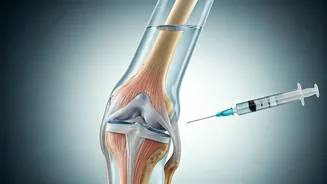Injection Relief Explained
Dealing with knee pain can be a major disruption. For many, knee injections present a pathway to decreased discomfort and enhanced mobility, potentially
putting off the need for invasive procedures. These injections target the knee joint to reduce inflammation, lessen pain, and boost overall function. Numerous individuals report experiencing significant relief, which can allow for a better quality of life and let them maintain a more active lifestyle. It's important to remember that knee injections aren't a permanent fix; rather, they can provide temporary respite. The duration of this relief fluctuates depending on the type of injection, the severity of the condition, and individual responses. Understanding the specifics of these treatments, including their benefits, limitations, and potential risks, empowers you to have better conversations with your healthcare provider and to make well-informed decisions concerning your knee health.
Common Injection Types
Several types of injections are frequently used to treat knee pain. Corticosteroid injections, which include cortisone, are widely used for their potent anti-inflammatory effects. They can rapidly reduce pain and swelling, providing short-term relief for various knee conditions, such as osteoarthritis and bursitis. Hyaluronic acid injections, often called viscosupplementation, are another popular option. These injections introduce a lubricant into the knee joint, which can help to improve joint function and reduce pain. Hyaluronic acid is naturally found in the joint, and the injections aim to supplement this to enhance joint movement and reduce friction. The choice of which injection to use depends on the underlying cause of the knee pain, the severity of the symptoms, and the patient's overall health. Your doctor will assess your condition and recommend the most suitable treatment, discussing the advantages and possible drawbacks of each approach to guarantee the best possible outcome.
When Injections Help
Knee injections are most effective when treating pain that stems from inflammatory conditions, such as osteoarthritis, which is a common degenerative joint disease. They can also offer relief for injuries that lead to inflammation, for example, bursitis, which involves inflammation of the fluid-filled sacs around the joint. In cases where the pain is linked to specific mechanical issues within the knee, injections might offer less benefit. Factors like the stage of the disease, your overall health, and your response to prior treatments will influence the success of the injection. Healthcare professionals often use injections as part of a more comprehensive treatment plan, often coupled with physical therapy, exercise, and lifestyle changes. This integrated approach aims to tackle the pain and address the underlying causes, leading to improved long-term outcomes and a delay in the need for more invasive treatments like knee replacement surgery.
Potential Risks and Side Effects
Like all medical procedures, knee injections have associated risks and potential side effects. The most common side effect is temporary pain or discomfort at the injection site. This usually subsides within a few days. Infection is a rare but serious risk; to mitigate this, healthcare professionals follow strict sterile techniques. Other possible side effects include bleeding, allergic reactions, and the potential for a temporary increase in pain. For corticosteroid injections, there's a small risk of joint damage with frequent use, and they might also affect blood sugar levels, which is a concern for individuals with diabetes. Before the procedure, your doctor will discuss these risks with you, which helps you make an informed decision and allows you to ask questions. Being aware of the risks helps you recognize any potential complications early and seek prompt medical attention if required, ensuring a safer and more effective treatment experience.
Long-Term Considerations
While knee injections can provide considerable short-term pain relief, they do not provide a permanent solution for underlying joint issues. The efficacy of these injections tends to decrease over time; individuals usually experience a shorter duration of relief with repeated injections. Therefore, repeated injections are not always recommended; doctors often favor a comprehensive approach to managing knee pain. This may include lifestyle modifications, such as weight management, regular exercise, and physical therapy. When injections lose their effectiveness, or when the underlying condition worsens, the conversation about more permanent solutions, like knee replacement surgery, becomes more crucial. Regular follow-up appointments with your healthcare provider are essential. They will monitor your progress and adjust the treatment plan accordingly to ensure the best possible care for your knee health and overall well-being. This proactive approach helps to manage pain effectively and improve your quality of life.















